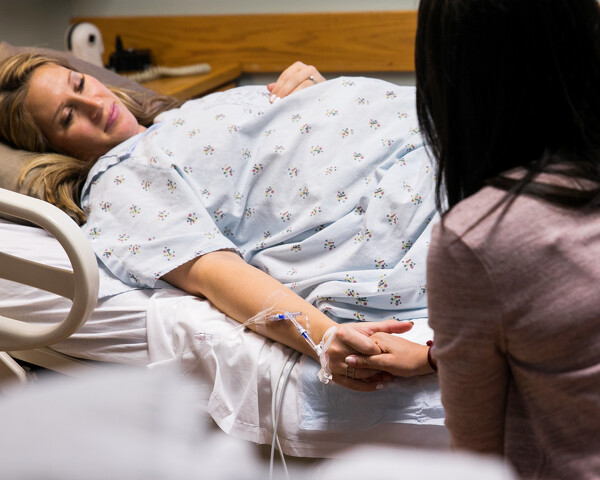
Emily Westerfield has been a gestational carrier for six different families.
CELINA - Initially inspired by the simple desire to help a loved one with infertility struggles, a Celina woman is now an experienced gestational carrier and a rising business owner.
Emily Westerfield, 38, formed family-building agency Carrying Dreams in August 2023 simply because she can't carry everyone's child.
"I wish I could, but obviously there's one of me and there's so many intended parents out there, unfortunately," she said. "Honestly, I wish that nobody had to use surrogates. And I wish they could all have their own babies, but the realistic fact of it is that we are needed by the people who choose to utilize surrogacy as their path to becoming parents."
Gestational surrogacy is when another person carries and delivers a child for another couple or person. The person who carries the pregnancy is called a "gestational surrogate" or "gestational carrier." The person who carries the pregnancy has no genetic relation to the baby.
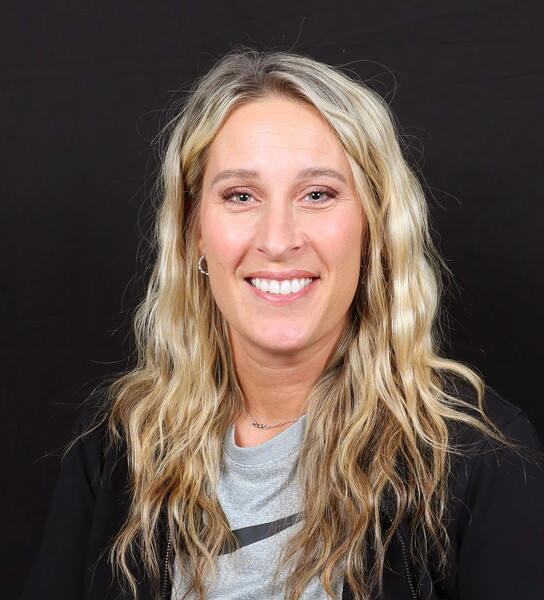
Emily Westerfield has been a gestational carrier for six different families.
Westerfield, originally from St. Marys, said her interest in surrogacy was born out of witnessing a family member deal with infertility.
"We had a cousin on my husband's side who struggled with infertility," Westerfield said. "They had their first child naturally, with no issues with the pregnancy and delivery and everything was great. But then they struggled with secondary infertility for a good, probably 10 years. She was able to get pregnant but then kept having miscarriages and kept having loss after loss."
Witnessing their struggle piqued Westerfield's interest enough to go online and research ways in which she could help.
"I actually, when I got online to start looking at (ways to help), I'm like searching, 'What do you do for someone who's experiencing a miscarriage?' Or 'How do we help a family member?'" She said. "You can be there for them, but like the typical things of sending them food or flowers, it didn't feel like enough. And they were - we love them, of course - they're family (and we wanted to help)."
As she was researching, surrogacy and egg donation continued to come up, but she had never considered either.
"And so when I started to look more and more into it, I wanted to understand what was involved and educate myself on the process and kind of figure out, 'What would I have to do? Do I even qualify? Can I help her this way?' And then, 'How do I approach somebody about carrying their baby?'"
That's where she got started, and she continued to educate herself and do research from there.
In the meantime, Westerfield had one more child of her own.
"It was after we had Charlie, who was our youngest, that I looked into it more seriously and it's all uphill from there," she said. Westerfield and her husband Max have three kids: McKenna, 14, Jack, 12, and Charlie, 11.
She ended up approaching her cousin about the possibility of being her gestational carrier, but it did not work out. However, she remained interested in possibly helping out another family with similar struggles.
"They still wanted to try themselves," she said. "I think for them too, it was very hard because they didn't have any answers. They didn't have any reasons why they were having miscarriages and they were still holding out for that last chance of hope to be able to carry for herself. I knew that obviously she's not the only person in the world who's dealing with something like this."
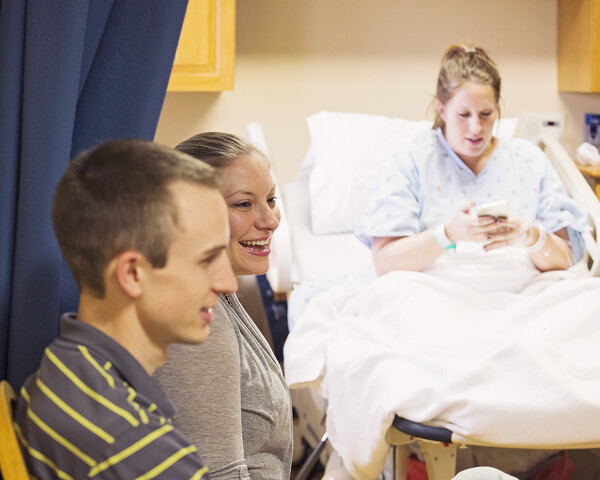
Intended Parents Adam and Laura await bedside while surrogate Emily is being checked in for delivery.
So Westerfield put herself out there and created a profile on a surrogate/egg donor website with her pictures and information.
"I was inundated with responses and people were reaching out, 'Please be my surrogate, here's all about us,'" she said. "And I was like, 'Oh my god.' So it was overwhelming, but heartbreaking at the same time too, because all of these people all have these awful stories and you know, just they want to have a baby so bad and they need the help of someone like me. So that's how I got started."
From the profile on the surrogate forum, she ended up matching with a couple from the Cleveland area.
"I really honestly just picked them because we were aligned with all of the same views and expectations for the journey," Westerfield said. "And they were close. And for me that was more important for my first journey, Cleveland Clinic was who we used, and it was close enough to go there. We were both on (our) first journey together."
Since then, she has served as a gestational carrier for six different families, birthing two sets of twins for a total of eight babies.
"In the very beginning, I had no idea how long it took to even get started and then have to go through medical screening, psychological screening and background checks," Westerfield said, adding that the prescreening process lasts at most four months. "There was a full medical screening that we, me and my husband, had to go through. He had to go through all of these steps with me as well. (He had to undergo) a psychological testing, he had to do a medical screening, not as involved obviously as mine was, but he still had to do infectious disease panels and drug screens."
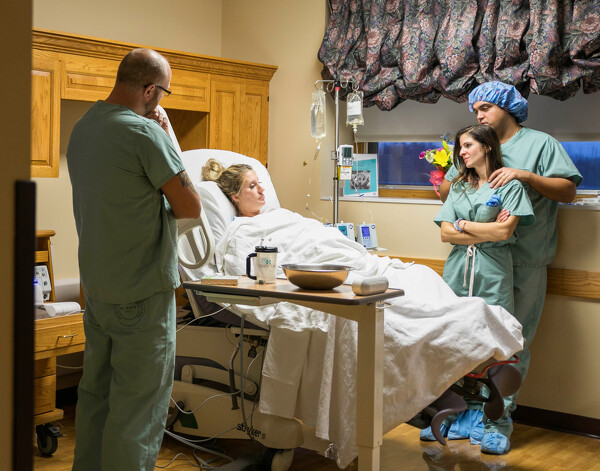
Surrogate Emily's husband Max and intended parents Simon and Angela await anxiously for the arrival of their twins.
The basic qualifications to become a gestational carrier include being 21-43 years old; having a solid support system; being a U.S. citizen; having a BMI of 35 or less; having had no more than three C-sections; having no history of pregnancy complications; having the ability to travel as needed for appointments, screenings, monitoring; and not relying on government, state or public assistance of any kind.
As well, Westerfield and the intended parents had to work out a legal surrogacy contract, which, she said, is imperative.
"Even if you were my sister and you wanted me to carry your baby, we still have to have a contract. This is too big of a journey and a thing to do, to not have things on paper," she said. "Even if you agree on everything, write it down."
The contracts are massive, she added.
"They're like, 40 to 70 pages long. I've seen some lawyers do longer ones, but they're huge and they're extremely detailed and involved," she said. "So it takes a good four to six weeks to get through even just legal contracts and making sure you understand it and you're comfortable with everything in it."
Important topics covered in surrogacy contracts include where the two parties stand on a potential pregnancy termination, compensation, the preferred doctors and more.
"Once we were done with that, then they started on a medication calendar and protocol. So I started on a heavy medication regimen, which then was a good three and a half weeks of just testing my body and my hormones and doing ultrasounds and scans and making sure that my uterine lining got to a thickness and a point where they wanted it to be," she said. "It's great because science, first of all, has come such a long way in that amount of time, but also it's cool to see how they're specifically manipulating my body with all these meds to do exactly what they need to do to get me prepped for that one day."
Once a surrogate is medically ready, the embryo transfer is scheduled.
"Based on how my numbers look and how everything looks, based on those tests," Westerfield said, "they schedule the embryo transfer and then fingers crossed everything goes well. And luckily it (her first embryo transfer) was successful and so then it was nine months after that (she gave birth)."
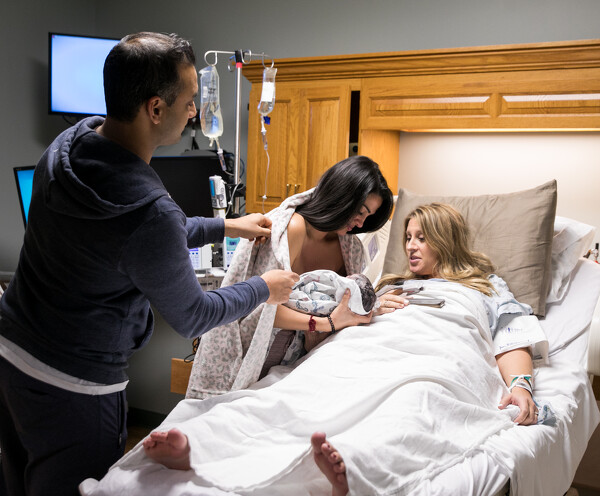
New parents Anuja and Mehul show off their baby girl with their surrogate Emily.
The base compensation for surrogacy is $35,000 to $65,000, Westerfield said.
"Once you have done it once before and you're an experienced carrier and you're a known, proven surrogate, then you're able to have a higher base compensation," Westerfield added. "You understand the process that you have to go through, you understand the timelines, you understand the medication schedule. So it's a lot easier of a pill to swallow, and you're not kind of going in there so much with all the unknowns and the questions ... you get it and you know what to expect now."
Westerfield started the family-building agency Carrying Dreams in 2023 as a way to help the intended parents that she is unable to physically help herself.
The company specializes in facilitating surrogacy and also manages an egg donor database that currently has more than 400 donors.
As a surrogate or "journey" facilitator, Westerfield acts as a case manager for intended parents and potential gestational carriers, essentially serving as a central point of contact. She guides the parents, offers them a listening and experienced ear, and supports them in any way she can.
Through Carrying Dreams, she works with people all over the country and Canada.
"I would say I work with anywhere from 50 to 70 (fertility clinics) across the United States and Canada," she said. "I have five I work with in Canada because a lot of international parents work with Canadian clinics. But yeah, I mean there's a lot. Wherever the parents' embryos are is who we work with."
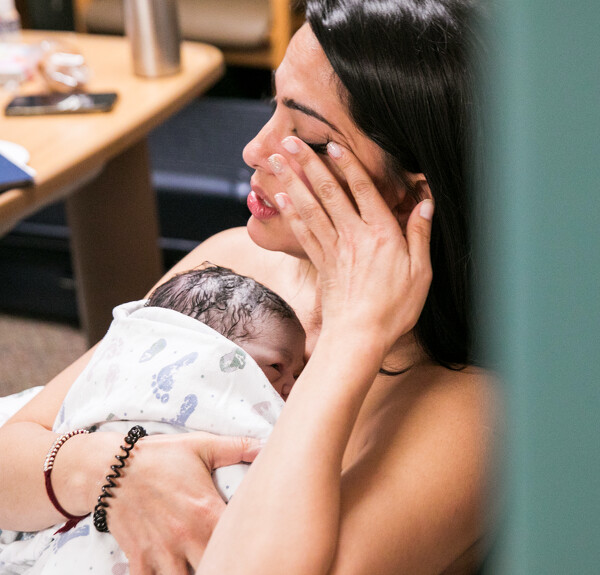
New mother Anuja is overwhelmed with emotion as she gets to hold her baby girl for the first time, after birth via surrogacy.
In addition to egg donation and surrogacy, Carrying Dreams also has a referral program, where people can refer a friend and earn money.
"Carrying Dreams continues to grow, and I constantly need donors. I need surrogates," Westerfield said. "We have lots of intended parents who are waiting for surrogates mainly, but also egg donation."
The compensation within the referral program varies. But for a surrogate referral, people can earn $1,000 for each friend or family member referred that becomes a surrogate. Those who refer someone for egg donation can receive $250-$500 for every successful egg donor referral.
Although she is busy building her business, Westerfield did not rule out another pregnancy in the future.
"I'm open to it," she said of whether or not she'd be a gestational carrier again. "Never say never. I've had 11 babies in the last 13 years. It is the biggest chapter of my life - one that I know I will be devastated when I have to close."
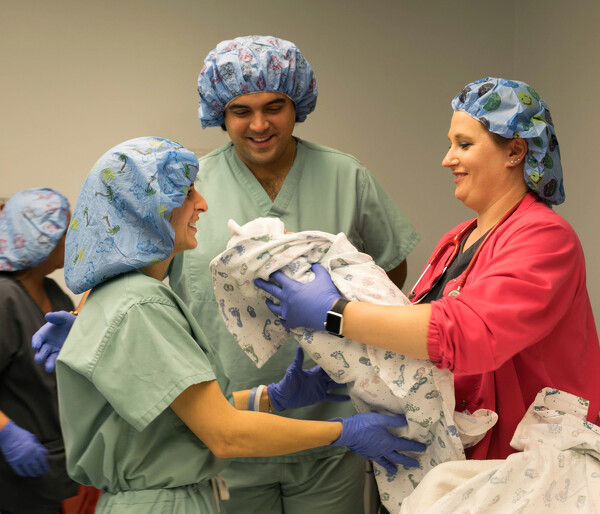
New mother Angela is handed her baby for the first time after surrogate delivery as her husband Simon looks on.
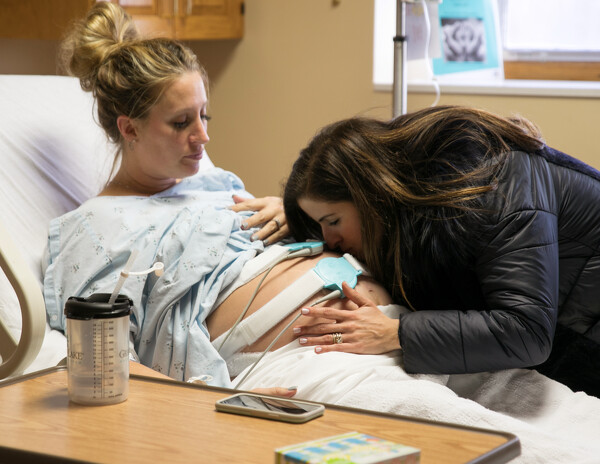
Soon-to-be mother Angela kisses the belly holding her unborn surrogate twins, expected within hours.
